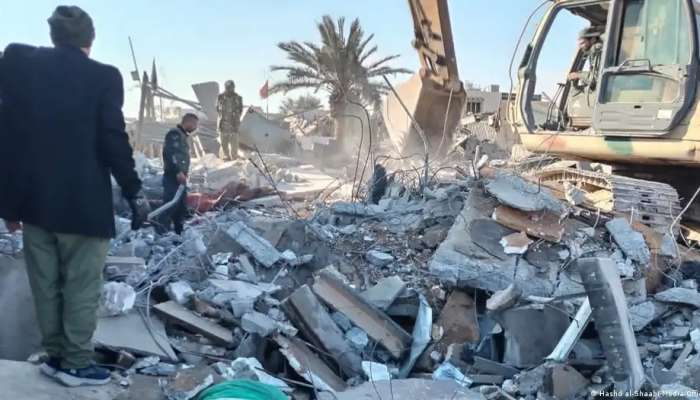
Washington: Syria and Iraq have all vehemently criticised US strikes which came in retaliation for a drone attack that killed three US soldiers in Jordan.
The US has blamed an Iran-backed umbrella group for the attack on January 28. The US military said it hit more than 85 targets in Syria and Iraq overnight on Friday, including control operation centers, intelligence centres, rockets and munition supply chain bases of militias and their Iranian sponsors "who facilitated attacks against US and Coalition forces."
"Last night's attack on Syria and Iraq is an adventurous action and another strategic mistake by the US government, which will have no result other than intensifying tension and instability in the region," said Nasser Kanani, Iran's Foreign Ministry spokesman, in a statement.
Syria's Foreign Ministry issued a statement in the same vein, saying: "What [the US] committed has served to fuel conflict in the Middle East in a very dangerous way. " Iraq said the airstrikes were a "violation of Iraqi sovereignty" and "pose a threat that could lead Iraq and the region into dire consequences."
"The outcomes will have severe implications on the security and stability in Iraq and the surrounding region," said Iraqi military spokesman Yahya Rasool.
According to Iraqi government spokesman Bassim al-Awadi, the US strikes killed at least 16 people, including civilians, while wounding 23 others.
The Syrian Observatory for Human Rights, a UK based group monitoring the conflicts in Syria, said the strikes there killed no civilians. But at least 23 pro-Iran fighters were dead, updating an earlier toll of 18.
"The toll has risen to 23 dead: 10 pro-Iran fighters in the Deir Ezzor area and 13 in the Mayadeen area," said Rami Abdurrahman, the Observatory head.
Abdurrahman said nine of the fighters were Syrians and six were Iraqis. Other pro-Iran forces were evacuating positions in Deir Ezzor for fear that more US strikes could be imminent, he added.
The drone attack on January 28 killed three US soldiers and injured dozen others at a small US base in Jordan near the border with Syria. In a statement on Friday, President Joe Biden said he had attended the return of the remains of the three soldiers at Dover Air Force Base in the US.
"This afternoon, at my direction, US military forces struck targets at facilities in Iraq and Syria that the IRGC [Iran Revolutionary Guard Corps] and affiliated militia use to attack US forces," said Biden.
"Our response began today. It will continue at times and places of our choosing," he added. "The United States does not seek conflict in the Middle East or anywhere else in the world. But let all those who might seek to do us harm know this: if you harm an American, we will respond."
Iran denies responsibility for Jordan attack
The series of US strikes lasted about 30 minutes, National Security Council spokesman John Kirby said, adding the Defense Department was still assessing the results.
The Biden administration has made it clear that it wouldn't be just one hit, but a "tiered response" over time, meaning the strikes could only be the first of a set of responses by the Biden administration.
Iran has denied it was behind the attack on the US base in Jordan. On Friday, Iranian President Ebrahim Raisi repeated Tehran would retaliate if the US strikes were to target its interests. We "will not start a war, but if a country, if a cruel force wants to bully us, the Islamic Republic of Iran will give a strong response," he said.
The British government also weighed in on the attacks, saying it supported the US' "right to respond to attacks."
"The UK and US are steadfast allies," a British government spokesperson said in a statement. "We have long condemned Iran's destabilizing activity throughout the region, including its political, financial and military support to a number of militant groups."
The EU, for its part, warned that the continuing instability in the Middle East as partly reflected by the US strikes was a danger to global security.
"The Middle East is a boiler that can explode. And certainly, there are attacks both on the Lebanon border; north and south; there are attacks in Syria; there are attacks in Iraq, attacks in the Red Sea," said top EU diplomat Josep Borrell.
Borrell said the bloc called on "everybody to try to avoid an escalation."